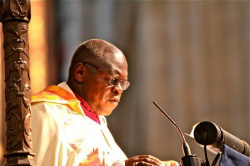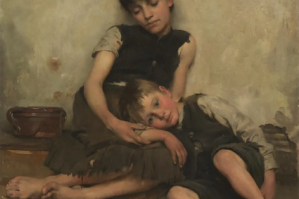Archbishop Sentamu urges consumers to buy British, buy locally, direct from farmers'
Dr John Sentamu, the Anglican Archbishop of York, has urged a "return to a 'buy British' mindset for the food that we eat."
Speaking at a meeting of the York East National Farmers Union the Archbishop spoke of the importance of food security and self-sufficiency.
"Food security is important to us not only as a nation but globally.
Discussions around the issue of food security tend to confuse domestic self-sufficiency with the wider issue of food security. We need to try to consider what can be done to increase food security both nationally and internationally and also what role self-sufficiency might have in this."
Dr Sentamu commented on the amount of food that that is imported into the United Kingdom and asked whether the time had come to think more of food self-sufficiency:
"I believe self-sufficiency is an increasingly important part of any domestic food security strategy, in which government and wider society must play their part.
"This does not mean a ban on any foods produced abroad. But let's identify those foods which can be produced locally and lets urge a return to a "buy British" mindset for the food that we eat. Not through some simplistic nationalism but rather because of the plain sense it makes in terms of economy, sustainability and security.
"The UK has long been an importer of food in order to satisfy its domestic consumption. From the First World War until the 1960s almost half of our food was imported. Now it is around about 40% of our food as a whole which is imported.
"Buying British, buying locally and buying directly from farmers can all help as simple measures. A Government led campaign which promotes each of these would be a good start.
"It has been remarked that much of the food we eat is more well-travelled than we are. Food in general travels much further today than ever before with 40% of all freight is related to food.
"Some 29% of the vegetables and 89% of the fruit we eat, for example, are imported. And in spite of organic food's environmental benefits at the point of production, over half of that consumed in the UK is currently imported. At the same time as the self-sufficiency ratio is falling, we are also experiencing a growing sense of unease about the power of globally-sourcing supermarkets; about the sharp decline in farm incomes; about public health concerns with food safety.
"There is growing awareness of environmental issues; the potential for short-term interruptions to fuel supply, and longer-term concerns over energy security and climate change."
The Archbishop also highlighted the problems faced by meat farmers and argued for more people to buy their meat locally:
"Let's take meat production as an example. The UK is the largest sheep producer in Europe and the third largest beef producer. What reason is there to be buying these meats from abroad?
"Animal welfare standards in the UK are second to none, likewise traceability arrangements. Additionally the Red Tractor assurance scheme gives consumers added confidence from farm to pack, and the entire process from farm to supermarket shelf.
"At a local level, grazing livestock are a key component in the rural economy, supporting feed businesses, veterinary practices, machinery dealers and repairers and agricultural merchants.
"If cattle and sheep disappear from the English uplands, they will take very many jobs with them. A survey produced for the National Farmers Union by YouGov reported that 72 per cent of shoppers want to be able to buy British beef and lamb.
"And yet the situation for many livestock farmers is that they would be better off financially if they gave up producing cattle and sheep.
Add in the other risks associated with keeping livestock and the disincentives to continue with production enterprises will soon become overwhelming."
Source: CoE Comms





















